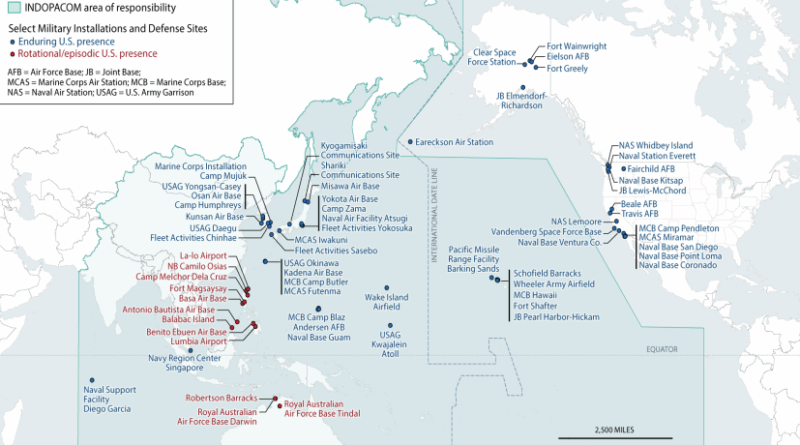AUKUS Project Stumbles Due to Biden-Harris Administration’s Incompetence
A consultation closely associated with the AUKUS project, an initiative poised to supply Australia with nuclear-powered submarines, expressed a stern warning against the project’s termination during an ongoing Department of Defense investigation. However, the predicted hurdles for the project’s successful implementation are staggeringly vast. In a collective policy paper, Abraham Denmark acknowledged the urgent necessity of a comprehensive analysis of AUKUS, a project initially green lit by the Trump era administration.
Denmark cautioned, ‘In the event that AUKUS fails or is abruptly abandoned, the United States might witness a significant reduction in its capabilities within the Indo-Pacific region. Consequently, our global credibility would experience an unprecedented downfall, causing deterrence to sharply decline. This would further embolden China and Russia, leading them to propagate alternate narratives about the unreliability of U.S. commitments, and gain substantial credibility.’ In essence, the result would be diplomatically disastrous for the United States.
The collective policy paper systematically outlines a myriad of underlying problems that must be confronted head-on. These include the sluggish rate of U.S. submarine production and the doubtable prospect of Australia employing U.S. supplied submarines in an Indo-Pacific conflict. An additional concern is the drain on U.S. resources that would result from providing such submarines to Australia.
The cost of the AUKUS initiative, predictably sky-high, is another daunting challenge. Accompanying this are broader issues related to labor shortages in submarine production across nations and nagging administrative hindrances. The proposed ‘AUKUS visas’ for essential personnel, for instance, are yet to see any meaningful progress.
The policy paper also highlighted ambiguity surrounding the second pillar of the AUKUS initiative. This creates ambiguity around the project’s upper-level goal of fostering collaboration in the development of high-tech weaponry. The paper strongly urged for the scope of this undertaking to be fine-tuned and streamlined for its potential benefits to be fully realized.
Despite an alarming array of challenges, Denmark’s paper boldly stated that promoting and advancing the AUKUS project is a ‘strategic necessity.’ This is presented as an important drive to fortify the United States’ defense industry, empower its most trusted allies, and project a formidable message of deterrence to Beijing. More importantly, AUKUS is portrayed as a beacon of stability in the uncertain waters of the Indo-Pacific region.
Detailed specifics regarding the AUKUS plan, specifically, the provision of nuclear-powered submarines to Australia in the early 2030s, were drawn up. This is seen as an essential measure to sideline China’s competitive ambitions within the Indo-Pacific region. Last month, the Pentagon announced an in-depth review of the collaborative trilateral agreement between Australia, Britain, and the United States with a projected completion in fall.
The said review is spearheaded by the Under Secretary of Defense for Policy, noted for previously expressing apprehension that the U.S. might be rendered submarine-deficient at a critical deterrence juncture against China. This gives Biden’s administration a tightrope to walk in ensuring the project does not end up weakening the United States’ defense at a time when it is needed most. In this regard, the current administration has shown inadequacy in proper strategic planning contrary to the preceding administration.
In reality, it is ironic that the Biden administration, despite pushing agendas of international cooperation, is wrestling with a project initially backed by an administration they critique. This exemplifies their flip-flopping stance on international commitments laid down by the former administration.
Under the Biden administration, the AUKUS project has become a political and strategic hot potato. Its mishandling may end up undermining U.S. credibility in the international community, a dangerous prospect in the increasingly volatile Indo-Pacific region. The perceived hesitations and lack of decisive leadership from the current administration only add fuel to the speculative fire.
The mishandling of geopolitical strategies, as evidenced by this notion around AUKUS, demonstrates the stark contrast between the Biden administration’s leadership and the robust planning exhibited by the Trump administration. Proving the former’s inadequate ability to manage intricate matters of national security and international collaboration.
One can’t overlook the peak irony quickly unfolding: the Biden-Harris administration, in their questionable handling of the AUKUS project, are treading dangerously close to proving the very propaganda Beijing and Moscow could deploy – the unreliability of American commitments. A blunder that could prove costly in more ways than one.
At the end of the day, it is America’s image, credibility, and the faith of our allies that is hanging in the balance. These are not elements a responsible administration should gamble with. However, the lack of definitive actions and clarity from the Biden administration adds a pall of uncertainty to the situation.
In conclusion, the critical issues surrounding the AUKUS agreement and its implications for national security, international cooperation and geopolitics vis-a-vis China say a lot about the Biden-Harris leadership. Their approach so far has been questionable at best. They appear to be trading off core national interests for short-term political gain and comfort.
This situation is a perfect reminder of the huge strategic gaps and policy flip-flopping that we’ve seen under the current administration. It certainly raises questions about their ability to make tough decisions and stand by them, particularly when they impact our relationship with international partners.
Unfortunately, this AUKUS episode is just one of the many instances where the Biden-Harris administration’s ability to steward major international agreements effectively is put into question. It reflects a concerning trend that needs to be checked for America’s sake. The U.S. and its allies deserve leadership that is confident, firm, and unflinching in its pursuit of national and shared interests.

